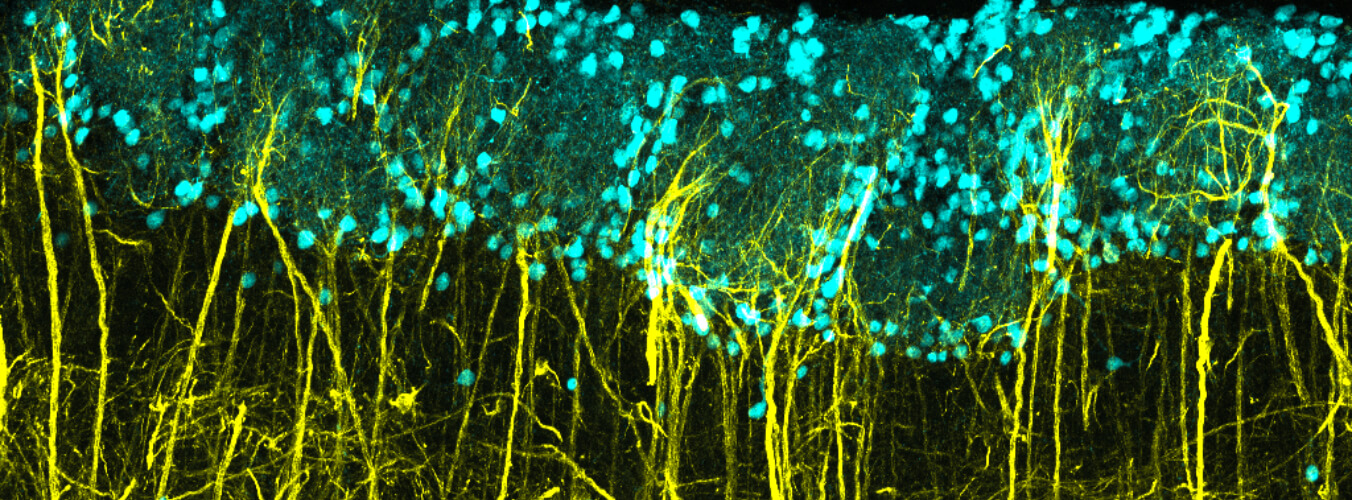The challenge
Understanding the brain and nervous system, in both health and disease, presents a profound scientific challenge. We are fortunate to be living in an era where there is a very real prospect of meeting this challenge. In doing so, we suggest that neuroscience research over the coming decade will lead to a fundamental understanding of the inner workings of the brain, of learning, language, intelligence and creativity, in turn allowing us to build intelligent technology and enhance human capabilities. The implications of such advances are huge and will impact how we understand ourselves as a species, how we evaluate and communicate information, and how we make optimal decisions that affect our future and that of society. Moreover, such fundamental understanding will provide the foundation for advances in understanding, preventing and treating neurological and psychiatric illness.
Why Cambridge?
Previous perspectives on the brain as a functionally isolated organ comprising separate cognitive systems– each carrying out distinct processes in isolated regions– are being replaced by a recognition that we must view its activities in terms of the organism as a whole and of the environment that it inhabits. Modern neuroscience faces the challenge of understanding the brain as an organ of integration that guides behaviour and interactions in its environments, with disease and impairment arising from disruptions to this integration. We can only understand the function and dysfunction of a highly integrated nervous system by adopting a highly integrated approach. The Cambridge Neuroscience community is meeting these challenges, by removing traditional boundaries between basic and translational neuroscience, and nurturing collaborations across research disciplines. We have established a series of cross-cutting themes to extend and support existing collaborations, as well as inspiring new ones across the breadth of neuroscience research in Cambridge. As these over-arching themes develop, the work within them will benefit from key strengths in Cambridge: first class researchers from a wide range of and expertise working in everything from biomedicine and maths, to psychiatry and philosophy, education, engineering and economics.
So why Cambridge and why us? Our integrated approach to neuroscience research from discovery and clinical, behavioural and computational neuroscience; a growing biomedical campus that is committed to supporting these new, multidisciplinary approaches; and ready access to opportunities for collaboration with pharmaceutical and neurotechnology industry partners.
How we work – interdisciplinary research in action
Neuroscientific research is rapidly evolving beyond its traditional boundaries and Cambridge is ideally-situated to meet the challenges that this poses and to exploit the opportunities that it will undoubtedly offer. These fresh perspectives are already embedded in neuroscientific research across Cambridge as exemplified by the following developments:
- Developing and implementing cutting-edge computational approaches to synthesise animal and human models of cognition has led to breakthroughs in our understanding of the neurocomputations that support adaptive behaviour with translational applications in the design of brain-inspired artificial systems and personalised interventions for neurocognitive disorders.
- Computational neuroscience and neuroengineering: Development of neural interfaces and wearable technologies that will enable us to learn more about how the body and nervous system function, as well as potentially opening up avenues to diagnosis and treatment. Similarly, research into Artificial Intelligence systems and computational approaches to understand decision making will not only aid understanding of complex neurobiological processes, but could also provide platforms for assisting with disease diagnosis.
- Pioneering work is exploring the profound impact of bodily disruptions to brain health, most notably in the immune system, in contrast to traditional approaches that have sought the causes of major mental illnesses such as depression in studying the brain in isolation. The implication of this work for new therapies is remarkable.
- Cutting-edge research into obesity and accompanying metabolic disorders, is drawing together insights into how bodily signals shape and drive, and are in turn influenced by, the higher order cognitive processes that influence appetite, reward and pleasure.
- Neurodevelopment: at the earlier stages of life, when many common and serious mental illnesses emerge, there are complex changes in brain and body as well as profound changes in the individual’s relationship with their social environment. There is already a major programme of multidisciplinary research into adolescent development in Cambridge and the recent funding of a dedicated children’s hospital which has, at its heart, the connection of physical and psychological medicine, will offer a unique setting and infrastructure to develop this work.
- Neurodegeneration, one of the most pressing concerns we face as an ageing population, exemplifies this demand for a diverse but integrated research programme encompassing basic cell biology, neuroimaging, psychology and neurology. In 2017, Cambridge was announced as one of the UK Dementia Research Institute (UK DRI) centres, a joint £250 million investment into dementia research led by the Medical Research Council (MRC) alongside charity partners Alzheimer’s Society and Alzheimer’s Research UK. Established in response to the Government’s 2020 Challenge on Dementia. The centre on the Cambridge Biomedical Campus focuses on interdisciplinary science, building on the University’s strengths across research areas from chemistry and biophysics through to cell biology of neurodegeneration.
These and numerous other existing examples of cross-disciplinary neuroscience in Cambridge demonstrate our unique position in bridging discovery to translational neuroscience and the institution-wide commitment to reshaping the field by removing traditional barriers and promoting integration. The Cambridge Neuroscience vision is to accelerate this by exploiting its over-arching role, developing unifying themes and ensuring that individual researchers and teams are encouraged to see themselves as part of a larger enterprise. Ultimately, this vision will be best realised within a dedicated neuroscience centre housing different disciplines to ensure optimal integration and dismantle barriers to collaboration.

